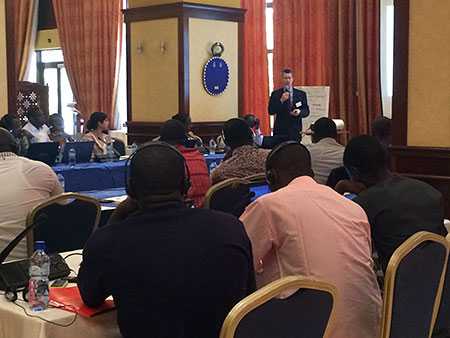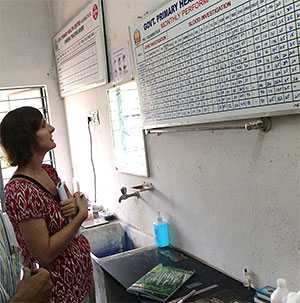Division of Bacterial Diseases (DBD) News Bulletin
Summer 2016, Issue 18

Photo: DBD medical epidemiologist, Matt Moore, presents at the Burkina RESPIRE project stakeholder meeting April 26 in Ouagadougou, Burkina Faso. The meeting brought together Ministry of Health, regional, and district health officials to introduce the project’s protocol and training plans. Burkina RESPIRE and the Field Epidemiology Training Program Frontline co-hosted the meeting.
In This Issue
Global Health Security Agenda Updates
CDC helped launch the five-year U.S. Global Health Security Agenda (GHSA) in 2014 that aims to make people around the world safer against the threat of infectious disease epidemics. The United States has made a commitment to assist at least 30 countries over five years to achieve the targets of GHSA, with more than half of this significant investment focused on Africa. The Global Health Security Branch in CDC’s Center for Global Health coordinates with CDC subject matter experts, including in-country staff, to help address priority areas in select countries. DBD’s longstanding relationships and significant experience working with global partners and in-country leadership are helping to fuel the success of CDC’s GHSA commitments. Recent and upcoming DBD activities include:
Burkina Faso: In March, DBD’s associate director for global health security agenda activities Sara Mirza and RDB epidemiologist Matt Moore were in Burkina Faso to continue collaborations for Burkina RESPIRE, the new GHSA project focused on strengthening surveillance and laboratory capacity to detect and respond to clusters of severe acute respiratory infections (SARI) in hospitals and communities. Burkina RESPIRE is designed to show measurable health impact within a short time period of support. DBD director Rana Hajjeh, Sara Mirza, Matt Moore and Jennifer Milucky joined the Burkina Faso Ministry of Health and the CDC Field Epidemiology Training Program (FETP)–Frontline–to host a Burkina RESPIRE stakeholders meeting in Ouagadougou, Burkina Faso in late April for participants from regions, districts, hospitals, universities, and other institutions across the country to learn about Burkina RESPIRE. In early June, Burkina RESPIRE trainings were integrated into the FETP-Frontline training curriculum. Rola Doughan, DBD’s new GHSA health communications specialist, will develop and coordinate translation of relevant materials to French.

Photo: Lesley McGee, microbiologist in the DBD Streptococcus Lab reviews monthly results of laboratory tests performed at the District Hospital in Thirruvallur District, Tamil Nadhu, India during a January, 2016 GHSA site visit.
In mid-June, DBD collaborated with the World Health Organization African Regional Office and CDC’s Division of Emergency Operations to host a sub-regional emergency management/preparedness workshop in Ouagadougou, Burkina Faso. Participants from 12 West African countries were invited to participate in sessions designed to help them strengthen their core public health capacities and gain emergency management skills to address the immediate threat of a meningitis epidemic.
Ghana: DBD staff conducted laboratory and epidemiology trainings to strengthen meningitis surveillance in the Northern, Upper West, and Upper East regions of Ghana in June. The division is collaborating with the Global Immunization Division on the Ghana Strengthening the Second Year of Life Project. Ghana will be one of the first countries in the meningitis belt of Africa to introduce serogroup A meningococcal conjugate vaccine into the routine immunization program. Read this Bulletin’s Epi-Aids and Investigations section to learn about DBD’s rapid response to the February 2016 outbreaks of pneumococcal and meningococcal meningitis in Ghana.
India: DBD staff are active in a CDC collaboration with the National Institute of Mental Health and Neurosciences, India to enhance existing surveillance for acute encephalitis syndrome (AES) to include surveillance for bacterial meningitis. CDC India staff are conducting hospital admission surveys to select appropriate AES sites for bacterial meningitis surveillance.
A collaboration with the Division of Viral Diseases (DVD), the Influenza Division (ID), and CDC India staff with the National Institute of Epidemiology in Chennai, India will establish facility-based and event-based surveillance for acute diarrheal diseases, acute febrile illness, and severe acute respiratory illness in Tamil Nadu, India. In March, two Epidemic Intelligence Service officers from ID and DBD, and an epidemiologist and laboratory specialist from DVD conducted site visits to document baseline capacity for facility-based surveillance and understand existing event-based surveillance for acute febrile illness in Tiruvallur District, Tamil Nadu.
Mali: In March, DBD staff met with Mali’s new Minister of Health, Dr. Marie Madeleine TOGO, and the Mali Country Office team to discuss the current meningitis epidemic in the region and DBD’s activities to reinforce case-based meningitis surveillance in Mali.
Top of Page- Page last reviewed: June 30, 2016
- Page last updated: June 30, 2016
- Content source:


 ShareCompartir
ShareCompartir